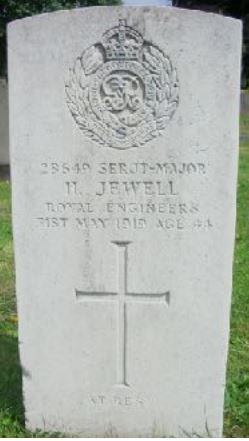Royal Engineers

Herbert Jewell was a career soldier, who was born in Axbridge, near Bath, Somerset in 1875.
On 16 October 1894, when aged 19 he enlisted into the Royal Engineers at Bristol, as a carpenter. He was promoted from Sapper to Corporal in 1904 and on 14 November 1909 to the rank of Serjeant. On 21 January 1915 he became a Company Serjeant Major and became an Acting Regimental Serjeant Major (RSM) based at 32 Division HQ on 18 August 1916.
Following enlistment he saw service in the UK and also in Bermuda (14 November 1896 to 10 January 1902), Jamaica (18 November 1905 to 6 November 1906) and Singapore (9 September 1910 to 17 December 1913). He was stationed in the UK from 18 December 1913 until war broke out in August 1914, wherein he was one of the early postings to the Western Front in Belgium / France on 15 August 1914. He remained on the Western Front until 3 October 1916, when he returned home prior to his discharge from the Army on the 15th of that month.
He appears to have been an exemplary soldier and was awarded a Good Conduct Medal (with gratuity) in 1913 and on several occasions he renewed his term of enlistment.
The Army considered him a ‘very superior carpenter’ and became qualified in defence electric lighting and as a submarine mining swimmer and diving attendant. A report on him declared he was ‘hard working and reliable with a knack of making others work’ and would make a good foreman. He also had considerable experience of explosives. His rise up through the ranks to Acting RSM is indicative of the esteem in which he was held.
Herbert Jewell married Mary Fegan in Bristol on 7 January 1903 and the couple had two children, Ralph Moses (born 5 October 1903) and Caroline Mabel (born 7 June 1905). His wife died in August 1906 and it is possible that he re-married in 1908 but this is not confirmed.
It is known that he served with 20th Company, Royal Engineers from the time he landed in France on 15 August 1914 and joined 4 Company on16 November 1915 before becoming Acting RSM at 32 Divisional HQ on 4 August 1916. He was also Mentioned in Despatches on 31 May 1915.
He left the Army on 15 October 1916, at the termination of his engagement and became an Army pensioner. It would appear that at that time he was suffering from a nervous breakdown, which may have accounted for his not being retained in the Army for the duration of hostilities.
He retired to live at Redhill Farm, Richards Castle, near Ludlow, Herefordshire.
He was found dead on 31 May 1919, at Long Meadow Field, Up Hatherley, near Cheltenham, his death certificate stating that death was due to ‘a gunshot wound self-inflicted while of unsound mind’. He was aged 44. The tragic circumstances of his death were related to the subsequent inquest held on 3 June 1919 (reported in the Gloucester Citizen).
Herbert was on a three week visit to his sister, Mrs Florence Cotton, of Green Farm, Up Hatherley. The visit had been for the benefit of his health. She stated that he had left the Army suffering from a serious nervous breakdown and ever since had complained of constant headaches. On the morning of 31 May 1919 she had taken him a morning cup of tea and he had complained of having a ‘rotten night’, adding ‘I have seen every horror as ever I saw in Belgium and I have fought every fight I fought in France during the night and my head is fit to split’. He had a terribly pathetic look in his eyes, as he had for months. Mrs Cotton went from the house for an hour in mid-morning and returned to find her brother missing, although his hat and coat were in their usual place. Looking out across the fields she saw her brother making his way home, hands in pockets. She had noticed that one of her husband’s shotguns was missing but thought nothing of it, as he had either taken it out with him or lent it to a friend or neighbour: certainly her brother carried no weapon. She went into the field to greet him but he had passed into an adjoining field, shielded by a thick hedge, so she could not see him. As she called out his name she heard a gun go off on the other side of the hedge; she ran to the gate and saw her brother lying dead, having shot himself in the head. She recalled that on that morning her brother had checked the date and it appeared that 31 May was a very important date in his military career as on that date he had performed an ‘extra-ordinary brave deed’ for which he was personally commended on the battlefield by Lord French, being also mentioned (in despatches). He was always very reluctant to talk about the war saying ‘for God’s sake let me forget’. She was in no doubt that some special horror on that day had unnerved him.
Exactly what that deed was we shall likely never know but Herbert Jewell was probably a victim of what we would now call ‘combat stress’ or ‘post-traumatic stress disorder’, a condition which was only slowly becoming recognised at the time of the Great War and the years after and for which treatment was very limited.
Perhaps surprisingly, Herbert Jewell was not buried in his home town of Ludlow but was placed to rest in Cheltenham Cemetery, where a CWGC headstone marks his grave.
According to his Pension Record Card (released via Ancestry in late 2018) an allowance of 10 shillings (50 pence) per week was paid to an unknown guardian of his daughter (possibly named Dover or located in the town of the name) from 16 October 1919, probably until she reached her 16th birthday in June 1921.
Researched by Graham Adams 15 January 2019 (revised)
